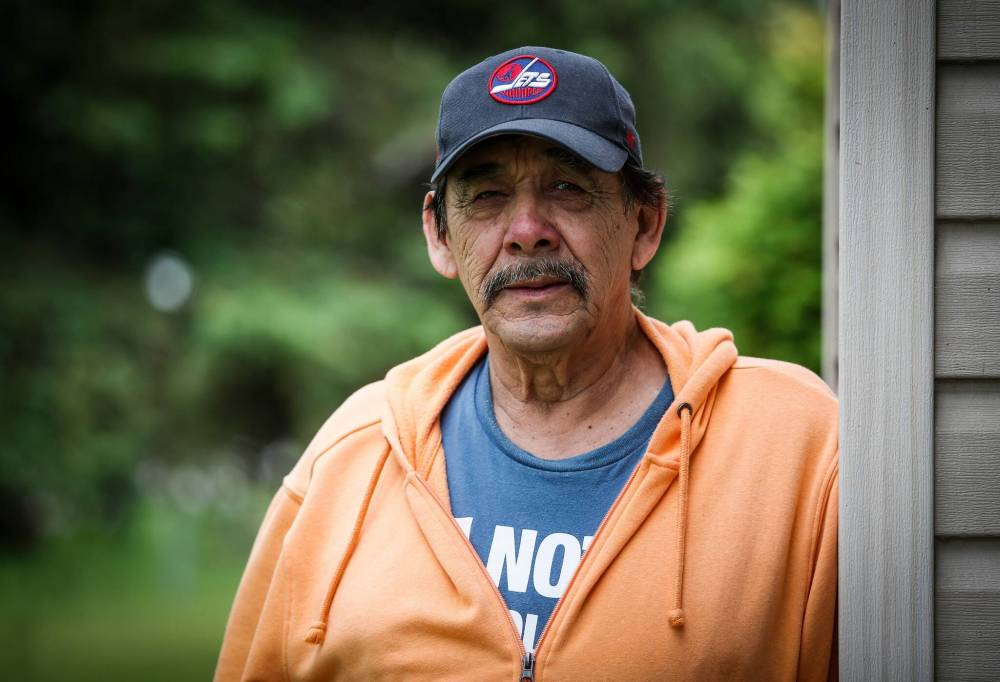A fourth Indigenous man wrongly convicted of a 1973 slaying is only days away from having his ordeal come to an end.
Clarence Woodhouse, one of four men charged with the murder of restaurant worker Ting Fong Chan, is scheduled to appear in a Winnipeg King’s Bench courtroom on Oct. 3, where it is expected his original conviction will be quashed and the court will acknowledge that he is innocent of the charge and a victim of a miscarriage of justice.
In making this appearance, Clarence Woodhouse is following in the footsteps of co-accused Allan (A.J.) Woodhouse and Brian Anderson, two of the other men charged with murder in Chan’s slaying.

JOHN WOODS / FREE PRESS FILES
Clarence Woodhouse is scheduled to appear in a Winnipeg King’s Bench courtroom on Oct. 3, where it is expected his original conviction will be quashed.
In June 2023, then-federal Justice Minister David Lametti quashed those convictions and returned their cases to Manitoba. The following month, in a hearing before Manitoba Court of King’s Bench Chief Justice Glenn Joyal and aided by lawyers from Innocence Canada, both men were acquitted of their original charges.
This year, in July, current Justice Minister Arif Virani quashed Clarence’s conviction.
James Lockyer, lead counsel for Innocence Canada, declined to speak on the specifics of next week’s hearing, which will occur on International Wrongful Conviction Day. However, he said it was a long time coming.
“It’s very good news that (Clarence is) going to be back in the same courtroom where he was convicted more than 50 years ago to finally see justice being done,” he said.
A fourth man, Russell Woodhouse, who is brother to Clarence, died in 2011.
As was the case with the hearing last summer, Clarence Woodhouse’s appearance in court is part of a bold and innovative approach to resolving wrongful convictions.
Typically, if Ottawa quashes a conviction through an application filed under Sec. 696 of the Criminal Code, it either returns the case to the provincial prosecution branch where it originally took place, or directs the case to be heard by an appellate court. In most instances, provincial justice officials decline to hold a new trial and either stay or withdraw the original charges.
Prior to last summer, justice officials never publicly acknowledged that a wrongfully convicted person was actually innocent of the original charges.
In this case, however, both Joyal and the Crown prosecutor went much further, acknowledging not only that the convictions were wrongful, but also that the two men were innocent and worthy of acquittals. They also said that racism played a role in motivating police and prosecutors to frame the four men for a brutal murder.
“You are innocent,” Joyal told the two men last year.
The four men involved in this case were charged in Chan’s slaying based on questionable eyewitness testimony and what turned out to be fabricated confessions.
New evidence from a forensic linguist, who examined the written confessions, determined that the word patterns were dramatically different than Anderson and Woodhouse’s speech patterns. In 1973, the two men, originally from from Pinaymootang First Nation, had only a rudimentary grasp of English.
At the time of the slaying, Clarence Woodhouse spoke little or no English. Despite this, police produced a full confession in English.
Police also ignored alibi evidence provided by the men, who claimed to have been at home asleep when Chan was killed. There were others living in the same house, but police never tried to interview them.
Also of note was the involvement of George Dangerfield, the prosecutor on this case. Dangerfield has overseen four other wrongful convictions involving Thomas Sophonow, James Driskell, Kyle Unger and Frank Ostrowski. Several other potential wrongful convictions involving Dangerfield-prosecuted cases are working their way through the justice system.
Not everything connected to this case has gone smoothly. Earlier this year, Allan Woodhouse and Brian Anderson filed a civil suit against the City of Winnipeg, the province and the federal government claiming unspecified compensation for their ordeals. Anderson served 10 years in prison, Woodhouse 23.
Ottawa and the city have asked Manitoba’s Court of King’s Bench to dismiss the lawsuit.
Following the acquittals last summer, the prosecutor in attendance, Michele Jules, said the same detective squad involved in this case had been accused of using violence and intimidation to produce fake confessions in other cases.
In response, the Winnipeg Police Service issued a statement that did not respond to that allegation, and did not apologize to the two men Joyal said were victimized by individual and systemic racism in both the investigation and prosecution stages of the case.
dan.lett@winnipegfreepress.com

Dan Lett
Columnist
Dan Lett is a columnist for the Free Press, providing opinion and commentary on politics in Winnipeg and beyond. Born and raised in Toronto, Dan joined the Free Press in 1986. Read more about Dan.
Dan’s columns are built on facts and reactions, but offer his personal views through arguments and analysis. The Free Press’ editing team reviews Dan’s columns before they are posted online or published in print — part of the our tradition, since 1872, of producing reliable independent journalism. Read more about Free Press’s history and mandate, and learn how our newsroom operates.
Our newsroom depends on a growing audience of readers to power our journalism. If you are not a paid reader, please consider becoming a subscriber.
Our newsroom depends on its audience of readers to power our journalism. Thank you for your support.